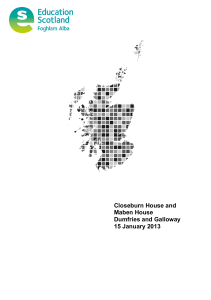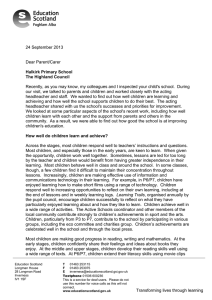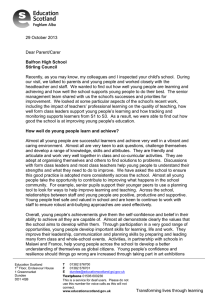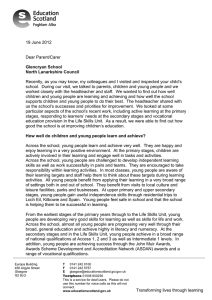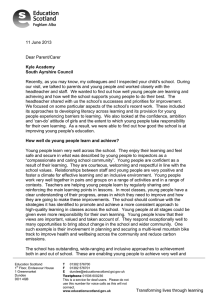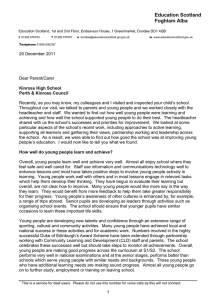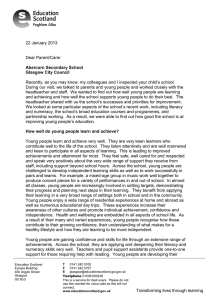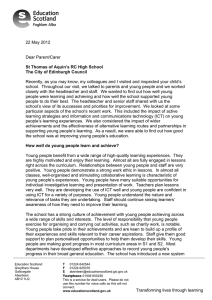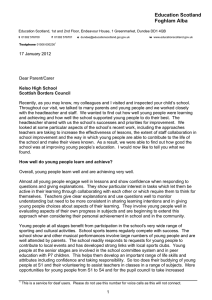Closeburn House and Maben House Dumfries and Galloway
advertisement
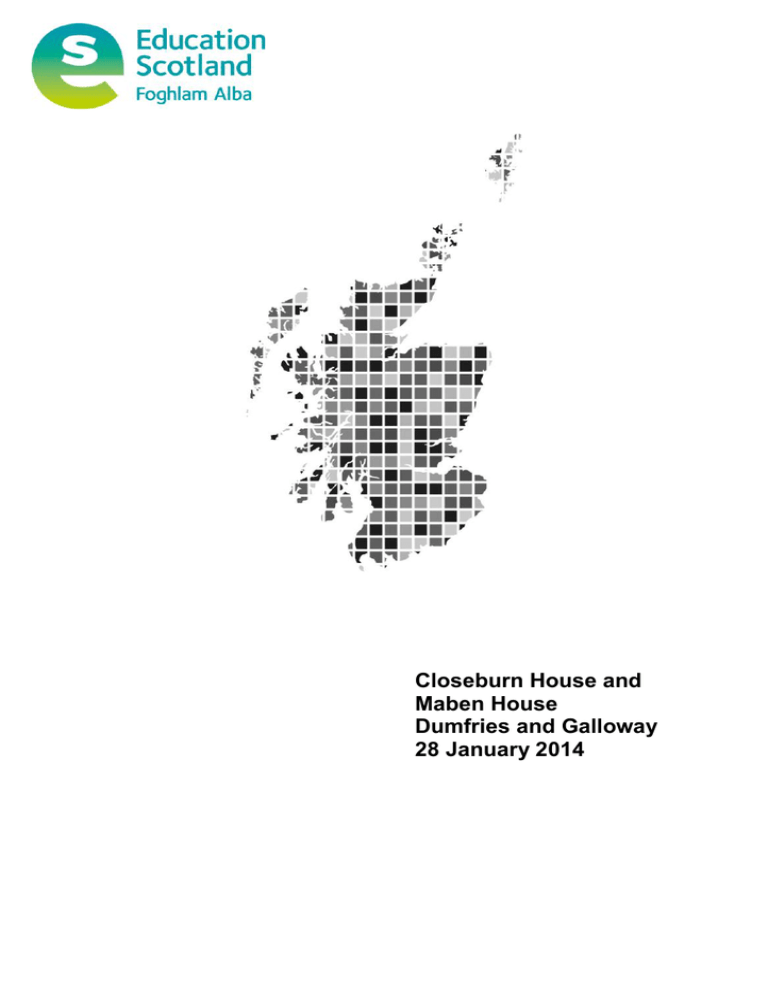
Closeburn House and Maben House Dumfries and Galloway 28 January 2014 Education Scotland inspects schools in order to let parents1 and young people know whether their school2 provides a good education. Inspectors also discuss with staff how they can improve the quality of education. At the beginning of the inspection, we ask the headteacher/senior managers and staff about the strengths of the school, what needs to improve, and how they know. We use the information they give us to help us plan what we are going to look at. During the inspection, we go into classes and join other activities in which young people are involved. We also gather the views of young people, parents, staff and partner agencies who work with the school. We find their views very helpful and use them together with the other information we have collected to arrive at our view of the quality of education. This report tells you what we found during the inspection and the quality of education in the school. We describe how well young people are doing, how good the service is at helping them to learn and how well it cares for them. We comment on how well staff, parents and young people work together and how they go about improving the school. We also comment on how well the school works with other groups in the community, including services which support young people. Finally, we focus on how well the school is led and how staff help the school achieve its aims. If you would like to learn more about our inspection of the school, please visit www.educationscotland.gov.uk. Here you can find analyses of questionnaire returns from young people, parents and staff, and where relevant, details about young people’s examination performance. We will not provide questionnaire analyses where the numbers of returns are so small that they could identify individuals. 1 Throughout this report, the term ‘parents’ should be taken to include foster carers, residential care staff and carers who are relatives or friends. 2 The term ‘school’ includes the nursery class or classes where appropriate. Contents 1. Background 2. How well do children and young people learn and achieve? 3. How well does the school support children and young people to develop and learn? 4. How well does the school improve the quality of its work? 5. What happens next? 1. Background In November 2011, HM Inspectors wrote a report with our findings. In the report, we indicated that we would return to the school to look at how it had continued to improve its work. Recently, as you may know, we visited the school again. During our visit, we talked to children and young people and worked closely with the acting headteacher and staff. We wanted to find out how well children and young people are now learning and achieving and how the school was continuing to support them to do their best. The acting headteacher shared with us how the school has continued to improve. We looked at particular areas that had been identified at our first visit and also areas where the school was continuing to improve. As a result, we were able to find out how well children and young people are now learning and achieving and how the school is continuing to support them to do their best. This report sets out what we found. 1 2. How well do children and young people learn and achieve? Across the school, children’s and young people’s learning and achievement continue to improve. Children and young people feel that the new school structure, where boys and girls learn together with others at the same stage, is helping them to improve. Children and young people understand what they need to do to keep fit and healthy and most are making good progress in developing their social and emotional wellbeing. Most young people are actively involved in their learning and can work well with others when given the opportunity. In most classes, children and young people are encouraged to do as much as they can for themselves and take responsibility for aspects of their learning. There is scope for this to take place more consistently in all classes. Young people achieve success in classrooms and beyond. They are developing their citizenship skills through charitable fundraising, such as the recent whole school Pudsey Bear event. At all stages, most children and young people are progressing well in literacy and numeracy. Staff recognise the need to further extend opportunities for young people’s achievements to be accredited. 3. How well does the school support children and young people to develop and learn? Young people benefit from a broad range of learning experiences. The curriculum now has a stronger focus on developing young people’s skills for learning, life and work. Staff have recently improved the curriculum for S4 and beyond to provide young people with greater choice and more challenging and relevant opportunities to build up their skills for life and work. They now need to develop a clear plan to further improve the curriculum, to ensure that children and young people, at all stages, make suitable progress across all aspects of the curriculum. Productive links with a wider range of partners, including colleges, local businesses and training providers are helping to prepare young people for moving on successfully from school. Teachers and care staff are planning together more effectively to address the specific health and wellbeing needs of children and young 2 people. Young people are much more involved in setting and reviewing targets which are personal and relevant to them. 4. How well does the school improve the quality of its work? The school’s capacity for improvement has strengthened since the original inspection. The recently appointed acting headteacher is engaging with staff in a meaningful and evaluative way. Staff are more involved and committed to identifying the school’s strengths and weaknesses. They recognise that there is scope for further improvement and are committed to improving the quality of learning, teaching and achievement. The school still needs to ensure that the system for monitoring and evaluating the quality of learning and teaching is leading to improvements in children and young people’s learning experiences and achievements. Staff would also benefit from the opportunity to share practice across the school and with other residential special schools serving children with similar needs. The school should continue with its plans to further develop approaches to assessing and tracking young people’s progress. 5. What happens next? Since the original inspection the school has made some important improvements. The acting headteacher has a clear vision for the school and enjoys the confidence of staff. However some further work remains to be done to improve the curriculum and approaches for evaluating the work of the school to promote continuous improvement. Our Independent Schools Link Inspector will continue to work with the school to build capacity for improvement and will maintain contact to monitor progress. We will make no further visits in connection with the original inspection. Olwynne Clark HM Inspector 3 If you would like to find out more about our inspections or get an electronic copy of this report, please go to www.educationscotland.gov.uk. Please contact us if you want to know how to get the report in a different format, for example, in a translation, or if you wish to comment about any aspect of our inspections. You can contact us at Enquiries@educationscotland.gsi.gov.uk or write to us at BMCT, Education Scotland, Denholm House, Almondvale Business Park, Almondvale Way, Livingston EH54 6GA. Text phone users can contact us on 01506 600 236. This is a service for deaf users. Please do not use this number for voice calls as the line will not connect you to a member of staff. You can find our complaints procedure on our website www.educationscotland.gov.uk or alternatively you can contact our Complaints Manager, at the address above or by telephoning 01506 600259. Crown Copyright 2014 Education Scotland
